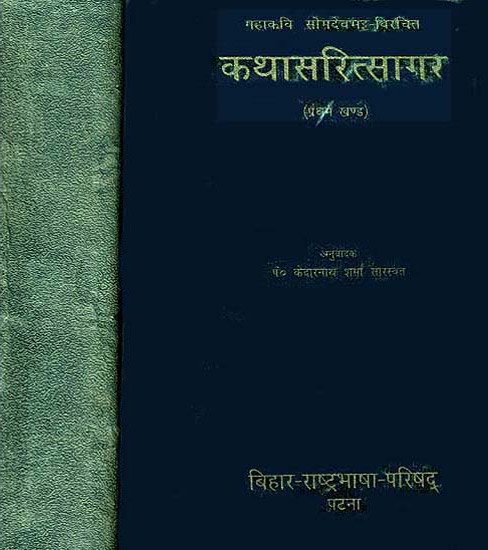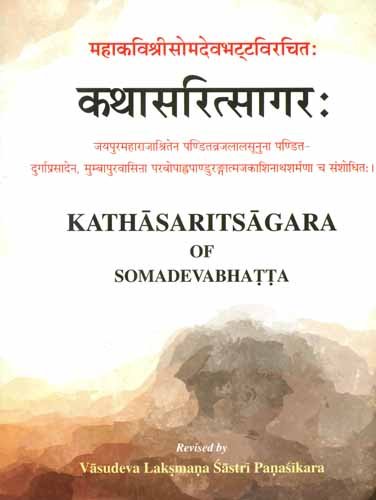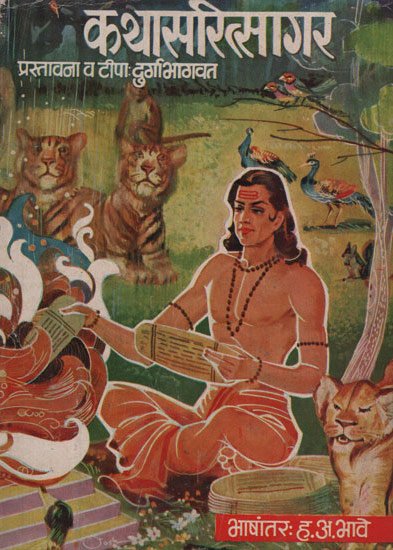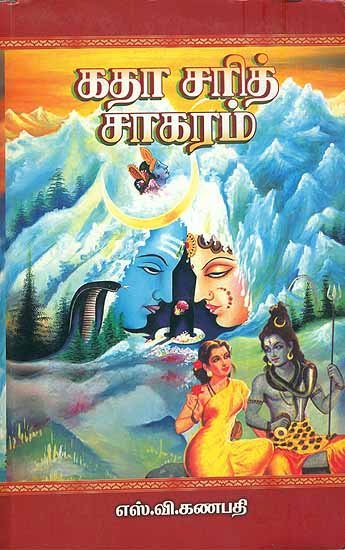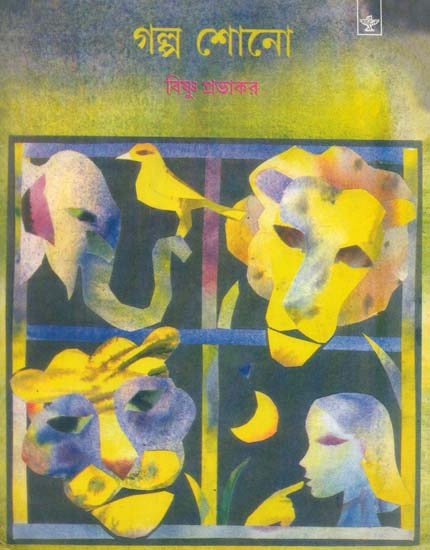Kathasaritsagara [sanskrit]
by C. H. Tawney | 2014 | 226,424 words | ISBN-13: 9789350501351
The Sanskrit edition of the Kathasaritsagara referencing the English translation and grammatical analysis. Written by Somadeva and dating from the 12th century, the Kathasaritsagara (or Katha-sarit-sagara) represents an epic legend narrating the adventures of Naravahanadatta as he strives to become the destined emperor of the Vidyadharas. Alternative titles: (Kathāsaritsāgara, कथासरित्सागर, Kathā-sarit-sāgara)
Verse 4.2.254
ततः प्रीतिप्रह्वामरनिकरम् आगत्य गरुडं प्रणेमुस् तं विद्याधरतिलकम् अभ्येत्य सभयाः ।
स्वदायादाः सर्वे हिमगिरिसुतानुग्रहवशान् मतङ्गाख्याद्या ये सुचिरम् अभजन्न् अस्य विकृतिम् ॥ २५४ ॥
tataḥ prītiprahvāmaranikaram āgatya garuḍaṃ praṇemus taṃ vidyādharatilakam abhyetya sabhayāḥ |
svadāyādāḥ sarve himagirisutānugrahavaśān mataṅgākhyādyā ye suciram abhajann asya vikṛtim || 254 ||
The English translation of Kathasaritsagara Verse 4.2.254 is contained in the book The Ocean of Story by C.H. Tawney. This book is available online or you could buy the latest edition:
Read online Buy now! The English translation by C.H. Tawney (2014)
Glossary of Sanskrit terms
Note: This extracts Sanskrit terms and links to English definitions from the glossary, based on an experimental segmentation of verse (4.2.254). Some terms could be superfluous while some might not be mentioned. Click on the word to show English definitions.
Tatah, Tad, Tata, Priti, Prahva, Ara, Nikara, Agatya, Garuda, Prana, Vidyadhara, Tilaka, Abhyetya, Sabhaya, Svada, Ada, Sarva, Himagirisuta, Anugraha, Vasha, Matanga, Yah, Yat, Sucira, Idam, Vikriti,
Analysis of Sanskrit grammar
Note: this is an experimental feature and only shows the first possible analysis of the Sanskrit text (Kathasaritsagara Verse 4.2.254). If the system was successful in segmenting the sentence, you will see of which words it is made up of, generally consisting of Nouns, Pronouns, Verbs, Participles and Indeclinables. Click on the link to show all possible derivations of the word.
- Line 1: “tataḥ prītiprahvāmaranikaram āgatya garuḍaṃ praṇemus taṃ vidyādharatilakam abhyetya sabhayāḥ ”
- tataḥ -
-
tataḥ (indeclinable adverb)[indeclinable adverb]tataḥ (indeclinable correlative)[indeclinable correlative]tataḥ (indeclinable)[indeclinable]tad (noun, neuter)[ablative single], [ablative dual], [ablative plural]tata (noun, masculine)[nominative single]√tan -> tata (participle, masculine)[nominative single from √tan class 8 verb]sa (noun, masculine)[ablative single], [ablative dual], [ablative plural]sā (noun, feminine)[ablative single], [ablative dual], [ablative plural]
- prīti -
-
prīti (noun, feminine)[compound], [adverb]prītī (noun, masculine)[adverb], [vocative single]prītī (noun, feminine)[compound], [adverb], [vocative single]prītī (noun, neuter)[compound], [adverb], [nominative single], [vocative single], [accusative single]
- prahvām -
-
prahvā (noun, feminine)[accusative single]
- ara -
-
ara (noun, masculine)[compound], [vocative single]ara (noun, neuter)[compound], [vocative single]√ṛ (verb class 1)[perfect active first single], [perfect active second plural], [perfect active third single]√ṛ (verb class 3)[perfect active first single], [perfect active second plural], [perfect active third single]√ṛ (verb class 5)[perfect active first single], [perfect active second plural], [perfect active third single]
- nikaram -
-
nikara (noun, masculine)[adverb], [accusative single]
- āgatya -
-
āgatya (indeclinable)[indeclinable]
- garuḍam -
-
garuḍa (noun, masculine)[adverb], [accusative single]
- praṇe -
-
praṇa (noun, masculine)[locative single]praṇa (noun, neuter)[nominative dual], [vocative dual], [accusative dual], [locative single]praṇā (noun, feminine)[nominative dual], [vocative single], [vocative dual], [accusative dual]
- mus -
-
mur (noun, masculine)[adverb]mu (noun, masculine)[nominative single]
- tam -
-
ta (noun, masculine)[adverb], [accusative single]ta (noun, neuter)[adverb], [nominative single], [accusative single]tā (noun, feminine)[adverb]tan (noun, masculine)[adverb]sa (noun, masculine)[accusative single]
- vidyādhara -
-
vidyādhara (noun, masculine)[compound], [vocative single]vidyādhara (noun, neuter)[compound], [vocative single]
- tilakam -
-
tilaka (noun, masculine)[adverb], [accusative single]tilakā (noun, feminine)[adverb]
- abhyetya -
-
abhyetya (indeclinable)[indeclinable]
- sabhayāḥ -
-
sabhaya (noun, masculine)[nominative plural], [vocative plural]sabhayā (noun, feminine)[nominative plural], [vocative plural], [accusative plural]
- Line 2: “svadāyādāḥ sarve himagirisutānugrahavaśān mataṅgākhyādyā ye suciram abhajann asya vikṛtim ”
- svadāyā -
-
svada (noun, masculine)[dative single]svada (noun, neuter)[dative single]
- adāḥ -
-
ada (noun, masculine)[nominative plural], [vocative plural]adā (noun, feminine)[nominative plural], [vocative plural], [accusative plural]√dā (verb class 1)[aorist active second single]√dā (verb class 3)[aorist active second single]√dā (verb class 2)[imperfect active second single], [aorist active second single]√dā (verb class 4)[aorist active second single]
- sarve -
-
sarva (noun, masculine)[nominative plural], [locative single]sarva (noun, neuter)[nominative dual], [vocative dual], [accusative dual], [locative single]sarvā (noun, feminine)[nominative dual], [vocative single], [vocative dual], [accusative dual]
- himagirisutā -
-
himagirisutā (noun, feminine)[nominative single]
- anugraha -
-
anugraha (noun, masculine)[compound], [vocative single]
- vaśān -
-
vaśa (noun, masculine)[adverb], [accusative plural], [ablative single]vaśa (noun, neuter)[adverb], [ablative single]
- mataṅgā -
-
mataṅga (noun, masculine)[compound], [vocative single]
- akhyād -
-
√khyā (verb class 2)[imperfect active third single]
- yā* -
-
yā (noun, feminine)[nominative plural], [accusative plural]yā (pronoun, feminine)[nominative plural], [accusative plural]
- ye -
-
ya (noun, masculine)[nominative plural]yā (noun, feminine)[nominative dual], [accusative dual]yaḥ (pronoun, masculine)[nominative plural]yat (pronoun, neuter)[nominative dual], [accusative dual]yā (pronoun, feminine)[nominative dual], [accusative dual]
- suciram -
-
sucira (noun, masculine)[adverb], [accusative single]sucira (noun, neuter)[adverb], [nominative single], [accusative single]sucirā (noun, feminine)[adverb]
- abhajann -
-
√bhaj (verb class 1)[imperfect active third plural]
- asya -
-
√as -> asya (absolutive)[absolutive from √as]a (noun, masculine)[genitive single]idam (pronoun, masculine)[genitive single]idam (pronoun, neuter)[genitive single]√as (verb class 4)[imperative active second single]
- vikṛtim -
-
vikṛti (noun, feminine)[accusative single]vikṛti (noun, masculine)[accusative single]
Other editions:
Also see the following editions of the Sanskrit text or (alternative) English translations of the Kathasaritsagara Verse 4.2.254
Kathasaritsagar
by Kedarnath Sharma Saraswat (2005)
The Only Edition with the Sanskrit Text and its Hindi Translation (An Old and Rare Book) Set of 3 Vol.
Buy now!
Kathasaritsagara of Somadeva Bhatta (Sanskrit Text Only)
by Vasudeva Laksmana Sastri (2013)
Katha Sarit Sagar in Marathi
by H. A Bhave (1995)
Set of 5 Volumes; Published by Varada Books, Pune. 2256 pages (Throughout B/W Illustrations).
Buy now!
Katha Sarit Sagara (Tamil)
by S. V. Ganapati (எஸ். வி. கணபதி) (2014)
[கதா சரித் சாகரம்] Published by Alliance Publications.
Buy now!
Galpa Shono
by Abhijit Chattopadhyay (2014)
[গল্প শোনো] Galpa Shono: Bengali Translation of 'Suno Kahani From Katha Sarit Sagar'; 9788126015436; Published by Sahitya Akademi, Delhi.
Buy now!Preview of verse 4.2.254 in Bengali sript:
ততঃ প্রীতিপ্রহ্বামরনিকরম্ আগত্য গরুডং প্রণেমুস্ তং বিদ্যাধরতিলকম্ অভ্যেত্য সভযাঃ ।
স্বদাযাদাঃ সর্বে হিমগিরিসুতানুগ্রহবশান্ মতঙ্গাখ্যাদ্যা যে সুচিরম্ অভজন্ন্ অস্য বিকৃতিম্ ॥ ২৫৪ ॥
![Kathasaritsagara [sanskrit] - book cover](/uploads/a/Katha-Sarit-Sagara.jpg)
